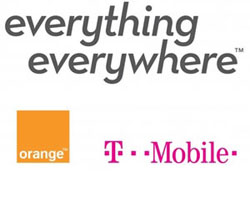Ofcom today gave the go-ahead for Everything Everywhere to use its existing spectrum allocation for 4G mobile services in the UK.
Ofcom's decision means Everything Everywhere – formed from the merger of Orange and T-Mobile – could offer a 4G network as early as September 2012 over its 1800MHz frequency.

A statement from the regulator said: "Ofcom has concluded that varying Everything Everywhere's 1800MHz licences now will deliver significant benefits to consumers. Delaying doing so would be to the detriment of consumers."
Everything Everywhere welcomed the announcement: "4G will drive investment, employment and innovation and we look forward to making it available later this year, delivering superfast mobile broadband to the UK."
Everything Everywhere had already been running 4G trials in Cumbria. The mobile operator recently launched a 4G roll-out campaign called 4GBritain, calling on the government to hasten the provision of 4G mobile data services in the UK.
A report from Sky News claimed Everything Everywhere's full-scale 4G services would launch in October. The Sky News report claimed Orange and T-Mobile would drop their individual branding to fully embrace the Everything Everywhere name.
A spokeswoman told Computer Weekly: "It is well-known that we ran a brand review last year. The outcome of that brand review is confidential.
"However, what we can say is that we remain committed to our hugely successful brands Orange and T-Mobile and continue to invest in them for the foreseeable future. Any suggestion otherwise is entirely speculative."
Complaints over unfair advantage
Yesterday, the secretary of state for media, culture and sport, Jeremy Hunt, confirmed that the spectrum auction for the two frequencies freed up by the digital television switchover – 800MHz and 2.6GHz – would occur in December. This will give other UK operators the chance to build their own 4G networks.
Speaking to Computer Weekly less than 24 hours before the regulator announced its ruling, Hunt said: "I don't want to second-guess what Ofcom will decide, but Ofcom's decision will be influenced by the desire to encourage roll-out as quickly as possible, but also to do it in a way that is fair to all players in the market."
Ofcom's concluded there will be no material risk that consumer benefits will be outweighed by a distortion of competition. But Everything Everywhere's rivals still believe allowing the network to launch first gives it an unfair advantage and could lead to further delays to December's auction.
"We are frankly shocked that Ofcom has reached this decision," said a spokesman from Vodafone.
"The regulator has shown a careless disregard for the best interests of consumers, businesses and the wider economy through its refusal to properly regard the competitive distortion created by allowing one operator to run services before the ground has been laid for a fully competitive 4G market.
"The regulator has spent several years refusing to carry out a fair and open auction. Now its decision today has granted the two most vociferous complainants during that entire process a massive incentive to further delay it."
All of the operators have had their part to play in delaying the auction. T-Mobile was the first to take legal action in 2008 after the proposed use of the 2.6GHz spectrum for 4G.
O2 and Vodafone have also threatened to take the process through the courts, as they are unhappy Ofcom has set aside a portion of the spectrum for mobile operator 3.
Vodafone also warned it would litigate against Ofcom if it gave Everything Everywhere the go-ahead for the 4G services. However, a Vodafone spokeswoman said the operator had yet to confirm if it was going to see through the threat.
An O2 spokesman told Computer weekly: "We are hugely disappointed with today's announcement, which will mean the majority of consumers will be excluded from the first wave of digital services. This decision undermines the competitive environment for 4G in the UK."





